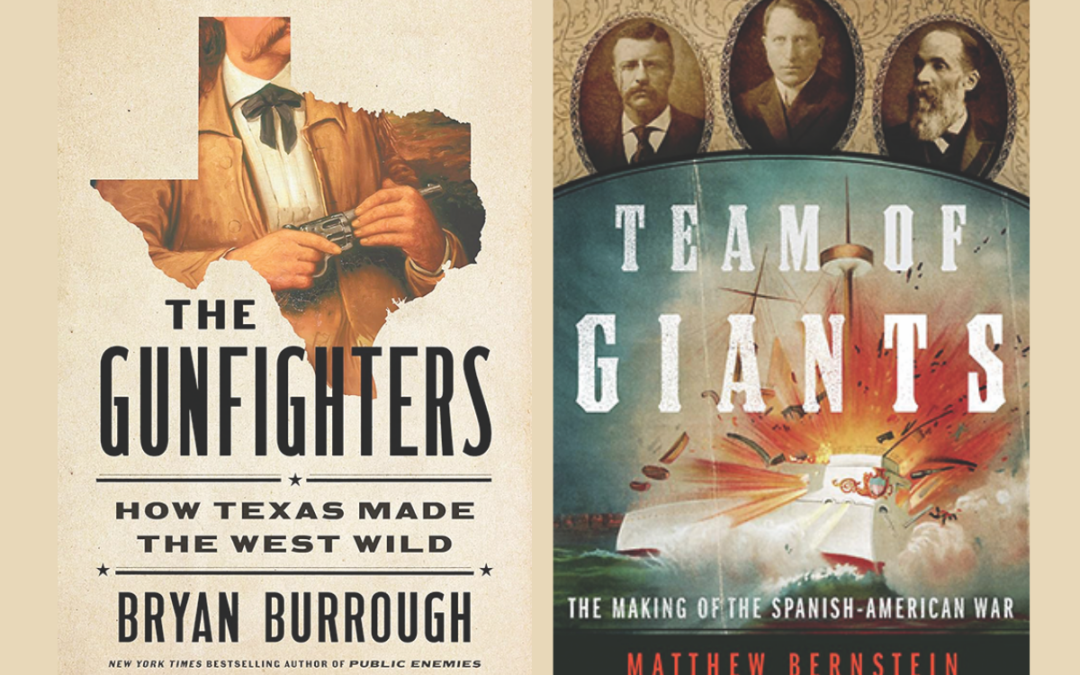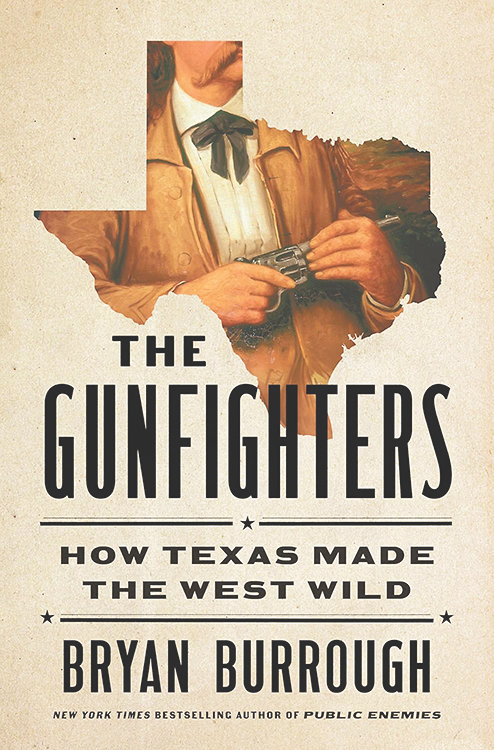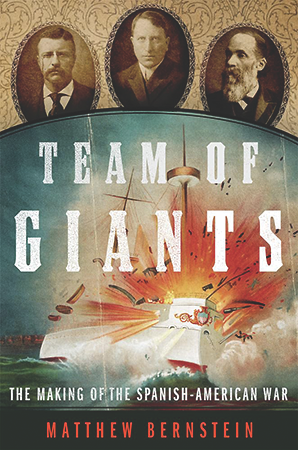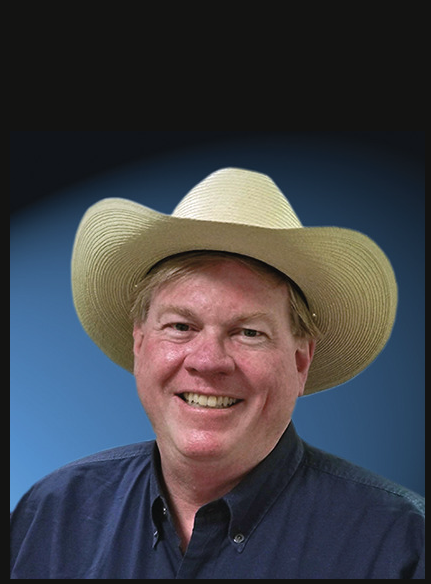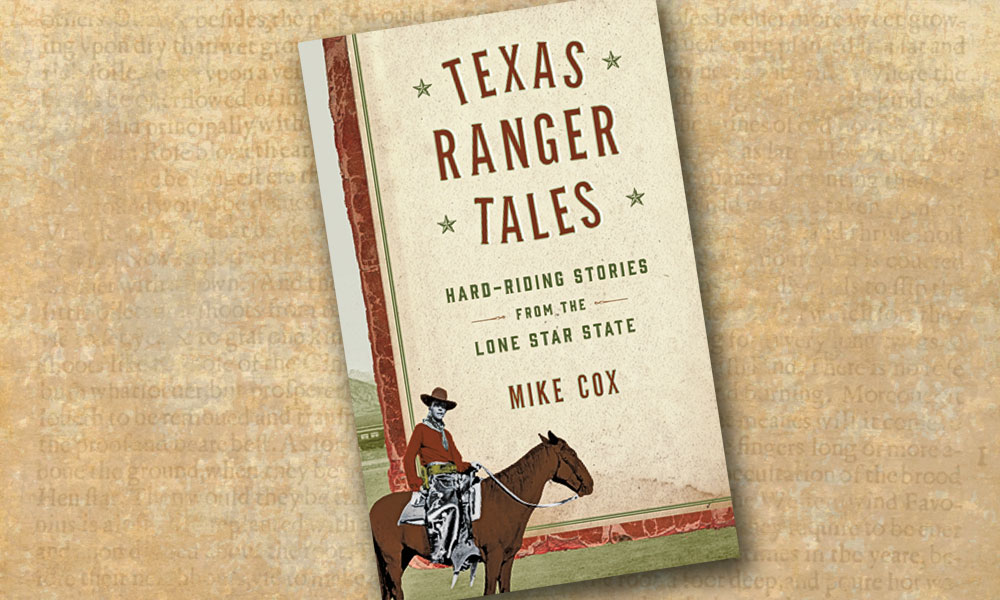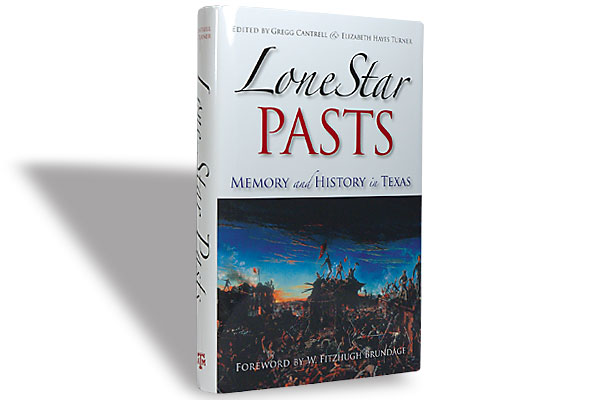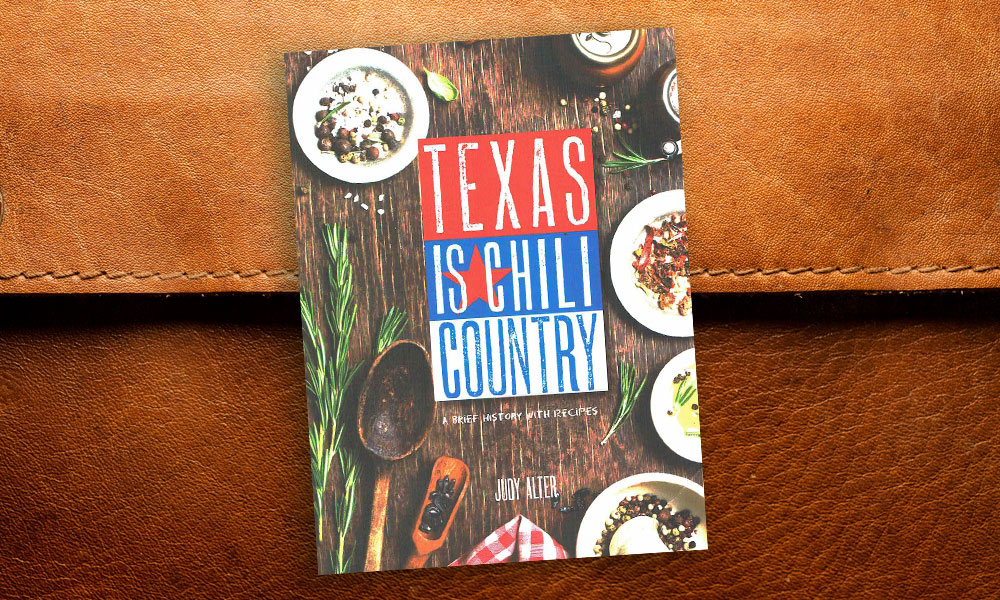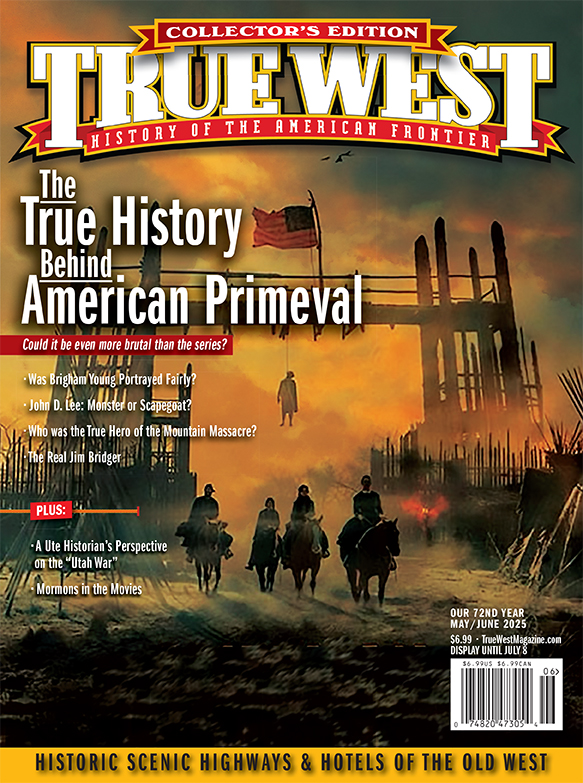From the Lone Star West to San Juan Hill
Three new books on Texas, Davy Crockett and the Spanish-American War, plus a classic Western anthology on Mexico and a revealing new history of the Mexican ciboleros
Texans like to take a lot of credit for creating the American West. Bestselling author Bryan Burrough’s The Gunfighters: How Texas Made the Wild West (Penguin Press, $35) will definitely affirm that idea for anyone who has Lone Star State roots, and many more who read the Austin, Texas, author’s latest well-crafted and well-researched American history.
Burrough’s The Gunfighters is an extremely well-organized, well thought out narrative history that is carefully crafted to prove his theory “about the role of honor on the 19th-century frontier, and about how one state, Texas—which produced far more gunfights and far more gunfighters than any other—disproportionately influenced its parameters. Because killing to defend one’s honor? Duels? Feuds? It all feels a little, well, Southern,” he wrote.
The Texas author marches the readers forward through 18th-century American history, the spread of the American empire across the West and the influence of the British dueling and Scot-Irish culture on the Southern American code-of-honor. As Burrough states, “the duelists’ legacy in the Old West was less about the physical structure of an armed confrontation than the reasons underlying it. Thousands of Southerners flowed west in the 1800s, and with them went their honor codes. …On the way west, this mindset evolves into something new, something explosive, thanks in large part to that ultimate frontier Southerner, the one who first meddled the passions of the Old South to the six-shooter: the Texan.”
Researchers and scholars of Western frontier gunfighter and outlaw history will want to read Burrough’s comprehensive study of the role of Texans in the history of violence in the American West. From frontier Texas to New Mexico, Arizona and the Rocky Mountain West, Burrough expertly demonstrates the influence of Texans on almost every major historical gunfight still analyzed and debated by current scholars, including the Earp-Clanton feud and the Lincoln County War.
I highly recommend Burrough’s The Gunfighters and believe it is one of the most important books written on the American West in many years. His bibliography, author narrative notes and endnotes are a great resource for readers and scholars. Burrough has established himself as one of America’s finest journalists and literary historians. But beware, if you meet a Texan who has read The Gunfighters, you will just have to agree that the Wild West begins and ends in Texas—or you’re sure to face a showdown over the facts.
—Stuart Rosebrook
Dawn of a New Century
Many Western historians’ interest in the Spanish-American War begins and ends with the Rough Riders. Scholar Matthew Bernstein’s Team of Giants: The Making of the Spanish-American War (University of Oklahoma Press, $36.95) reminds us of the individuals who violently catapulted the United States into the stormy waters of imperialism. Bernstein, who is the editor of The Wild West History Journal, expertly weaves the intriguing and world-changing influence of media mogul William Randolph Hearst, military and political hopeful Theodore Roosevelt and U.S. Congressman Joseph “Fightin’ Joe” Wheeler on President William McKinley’s decision to lead the United States into war against Spain in the Caribbean and the Western Pacific. Bernstein is an excellent researcher, and he writes with an entertaining literary style, which readers first enjoyed in George Hearst: Silver King of the Gilded Age. Bernstein rightfully thrusts Hearst back into the center of the story in Team of Giants, as his influence is still relevant to understanding the role of the modern press in American domestic and international politics.
Seizing the moment and opportunity for glory and power, Assistant Secretary of the Navy Theodore Roosevelt audaciously thrust himself onto the national stage and organized the soon-to-be legendary Rough Riders. Bernstein’s portrait of Roosevelt in Team of Giants leaves the reader wanting more on the future president and his Rough Riders, who are as intriguing as ever in the fast-paced narrative.
Bernstein’s decision to profile former Confederate and U.S. Congressman Joseph Wheeler is also a great reminder of the role of redemption in American politics. In a foreshadowing of the coming 20th century, Congressman Wheeler used his domestic position in the House of Representatives in the nation’s international affair, which catapulted him back into the U.S. Army as a major general and commanding officer of Roosevelt.
Researchers of the era will want to own Team of Giants for Bernstein’s valuable annotated end notes and bibliography. Students of wartime journalism will also value Bernstein’s research on the rise of the modern press and the Hearst corporation’s influence on American history, as well as his narratives on the rivalry between journalists Stephen Crane and Richard Harding Davis. We can only be patient as we wait for Bernstein’s next volume of American history.
—Stuart Rosebrook
Timeless Western Classic
First published in 1953, The Burning Plain (El Llano en llamas) by Juan Rulfo (University of Texas Press, $21.95) has earned its place as Mexico’s most significant and widely translated collection of short fiction. Set primarily in the harsh, unforgiving region of El Llano Grande in the state of Jalisco, the anthology’s 17 stories offer an unfiltered glimpse into life after the Mexican Revolution (1910–17) and the Cristero Revolt (1926–29). In these spare yet powerful tales, a father carries his dying son through the darkness in a desperate search for help. A young girl watches helplessly as a flood carries away her beloved cow and her family’s entire harvest. Elsewhere, a group of campesinos spend an exhausting day crossing the vast, barren Llano—the land the government has allotted them to farm. Through each story, Rulfo avoids sentimentalism and moral judgment, instead presenting an unflinching portrait of a landscape and people scarred by violence, hardship and injustice, and survival, resilience and the harsh realities of rural life in post-revolutionary Mexico.
—Erik J. Wright,
assistant editor of
The Tombstone Epitaph
The Hispanic Hide Hunters
The well-worn saga of the “Great Buffalo Hunt”—filled with rugged commercial hide hunters and the tragic ecological toll on one of North America’s most iconic animals—has long occupied a place in the narrative of the American West. In Ciboleros! Hispanic Buffalo Hunters on the Southern Plains (Museum of the Fur Trade, $50), Clive G. Siegle reminds us of buffalo-hunting pioneered by Hispanic hunters known as ciboleros. Spanning nearly two centuries, their hunting culture stretched from northern Mexico to present-day Colorado, leaving a profound mark on frontier life. The ciboleros adapted Spanish equestrian and military techniques to the hunt, developing a unique and highly effective strategy. Often relying on lances, they pursued buffalo in thrilling mounted corridas that rivaled the drama of medieval cavalcades. Riding horses specially bred for speed and endurance, they organized communal hunts that resembled annual pilgrimages onto the Llano Estacado—a vast, unforgiving landscape teeming with millions of buffalo.
—Erik J. Wright,
assistant editor of
The Tombstone Epitaph
Western Writers of America Honors Craig Johnson
Author Craig Johnson, whose novels about a Wyoming sheriff named Walt Longmire have made The New York Times bestseller list and inspired a popular TV series, is the 2025 recipient of the Owen Wister Award for Lifetime Contributions to Western Literature.
The award, given annually by Western Writers of America, will be presented at the WWA’s 2025 convention, on June 21 in Amarillo, Texas.
Previous Wister recipients include historians Will Bagley, David Lavender and Robert M. Utley; novelist-poet N. Scott Momaday; and bestselling novelists Rudolfo Anaya, Tony Hillerman, Elmore Leonard and Lucia St. Clair Robson.
Johnson started his series, published by Viking, with The Cold Dish in 2004. Another Man’s Moccasins (2008) and The Longmire Defense (2023) won Spur Awards from WWA, and Any Other Name (2014) was a Spur finalist. Return to Sender, the 21st novel in the series, will be released in late May.
Today, two decades since his first of 20 full-length Longmire novels, Johnson is an ambassador of Western literature and is considered one of the most influential authors of modern Western mystery writing in the 21st century.
“With my ranch only 15 miles from the Occidental Hotel here in Wyoming where the Virginian got his man, the weight and width of Owen Wister’s works cast a broad shadow across Western literature, and I’m simply stunned at having my name uttered alongside his,” said Johnson, who lives in Ucross, Wyoming, with his wife, Judy.
—Stuart Rosebrook
with Johnny D. Boggs

